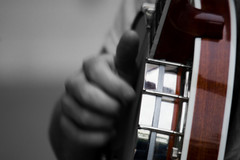And even in a piece about hurricanes, both natural and political, music plays its role:
I had glimpsed that stubborn affection in October, when the first secondline since Katrina wound its way through the debris-strewn streets of Treme. The secondline is the quintessential traffic-disrupting New Orleans art form; in this case, the Black Men of Labor, a social aid and pleasure club, marched in matching yellow print shirts, with matching hat bands and parasols, while the Hot 8 Brass Band followed behind them, blasting music into the mostly vacant neighborhood.One thing I find odd about the article (esp. given the broad range of issues it covers) is that it says nothing about the larger questions of whether we should expect more massive storms like Katrina as a result of climate change. 'Cause if the answer is "Yes" (and I've certainly not seen a convincing argument that it's "No") then that has profound implications for these issues of rebuilding, and makes the failure of FEMA and others to objectively and scientifically identify the highest risk areas particularly troublesome. (Note that I'm not suggesting that all such high risk areas be abandoned without discussion. But certainly that data is vital if good long-term plans are going to come out of those discussions, and people should understand the implications of increased storm activity for a re-built New Orleans.)
The other thing I find troubling, and this is a complex issue we're probably going to wrestle with all semester, is the assumed relationship between hardship (in this case poverty) and cultural innovation. Much (probably most) of the music we'll listen to this semester was made by people were by no means wealthy, and in many cases extremely poor. A remarkable thing, then, is this wonderfully rich and valuable music that they brought out of that experience for all of us to share. Is hardship necessary for the creation of certain kinds of great art and innovation? Do we collectively need places like the Lower Ninth Ward to create new cultural ideas? If so, are those new ideas worth that price? Who makes those judgements? The children growing up there, or reasonably comfortable folks at a distance (like us)? How do we even begin to talk about such things in a meaningful way?
'Nuff. Feel free to discuss further in the comments section of this post.

No comments:
Post a Comment